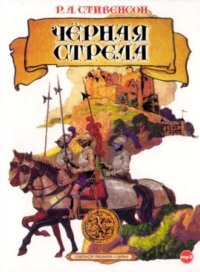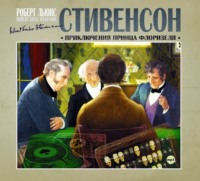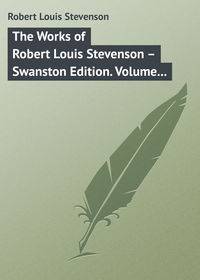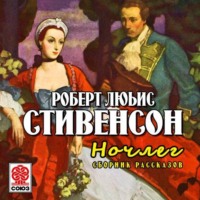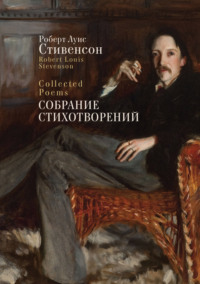 полная версия
полная версияThe Works of Robert Louis Stevenson – Swanston Edition. Volume 23
I have tried to write some verses; but I find I have nothing to say that has not been already perfectly said and perfectly sung in Adelaïde. I have so perfect an idea out of that song! The great Alps, a wonder in the star-light – the river, strong from the hills, and turbulent, and loudly audible at night – the country, a scented Frühlingsgarten of orchards and deep wood where the nightingales harbour – a sort of German flavour over all – and this love-drunken man, wandering on by sleeping village and silent town, pours out of his full heart, Einst, O Wunder, einst, etc. I wonder if I am wrong about this being the most beautiful and perfect thing in the world – the only marriage of really accordant words and music – both drunk with the same poignant, unutterable sentiment.
To-day in Glasgow my father went off on some business, and my mother and I wandered about for two hours. We had lunch together, and were very merry over what the people at the restaurant would think of us – mother and son they could not suppose us to be.
Saturday.– And to-day it came – warmth, sunlight, and a strong, hearty living wind among the trees. I found myself a new being. My father and I went off a long walk, through a country most beautifully wooded and various, under a range of hills. You should have seen one place where the wood suddenly fell away in front of us down a long, steep hill between a double row of trees, with one small fair-haired child framed in shadow in the foreground; and when we got to the foot there was the little kirk and kirkyard of Irongray, among broken fields and woods by the side of the bright, rapid river. In the kirkyard there was a wonderful congregation of tombstones, upright and recumbent on four legs (after our Scotch fashion), and of flat-armed fir-trees. One gravestone was erected by Scott (at a cost, I learn, of £70) to the poor woman who served him as heroine in the Heart of Midlothian, and the inscription in its stiff, Jedediah Cleishbotham fashion is not without something touching.7 We went up the stream a little further to where two Covenanters lie buried in an oak-wood; the tombstone (as the custom is) containing the details of their grim little tragedy in funnily bad rhyme, one verse of which sticks in my memory: —
“We died, their furious rage to stay,Near to the kirk of Iron-gray.”We then fetched a long compass round about through Holywood Kirk and Lincluden ruins to Dumfries. But the walk came sadly to grief as a pleasure excursion before our return…
Sunday.– Another beautiful day. My father and I walked into Dumfries to church. When the service was done I noted the two halberts laid against the pillar of the churchyard gate; and as I had not seen the little weekly pomp of civic dignitaries in our Scotch country towns for some years, I made my father wait. You should have seen the provost and three bailies going stately away down the sunlit street, and the two town servants strutting in front of them, in red coats and cocked hats, and with the halberts most conspicuously shouldered. We saw Burns’s house – a place that made me deeply sad – and spent the afternoon down the banks of the Nith. I had not spent a day by a river since we lunched in the meadows near Sudbury. The air was as pure and clear and sparkling as spring water; beautiful, graceful outlines of hill and wood shut us in on every side; and the swift, brown river fled smoothly away from before our eyes, rippled over with oily eddies and dimples. White gulls had come up from the sea to fish, and hovered and flew hither and thither among the loops of the stream. By good fortune, too, it was a dead calm between my father and me. Do you know, I find these rows harder on me than ever. I get a funny swimming in the head when they come on that I had not before – and the like when I think of them.
R. L. S.To Mrs. Sitwell
[Edinburgh], Monday, 22nd September 1873.I have just had another disagreeable to-night. It is difficult indeed to steer steady among the breakers: I am always touching ground; generally it is my own blame, for I cannot help getting friendly with my father (whom I do love), and so speaking foolishly with my mouth. I have yet to learn in ordinary conversation that reserve and silence that I must try to unlearn in the matter of the feelings.
The news that Roads would do reached me in good season; I had begun utterly to despair of doing anything. Certainly I do not think I should be in a hurry to commit myself about the Covenanters; the whole subject turns round about me and so branches out to this side and that, that I grow bewildered; and one cannot write discreetly about any one little corner of an historical period, until one has an organic view of the whole. I have, however – given life and health – great hope of my Covenanters; indeed, there is a lot of precious dust to be beaten out of that stack even by a very infirm hand.
Much later.– I can scarcely see to write just now; so please excuse. We have had an awful scene. All that my father had to say has been put forth – not that it was anything new; only it is the devil to hear. I don’t know what to do – the world goes hopelessly round about me; there is no more possibility of doing, living, being anything but a beast, and there’s the end of it.
It is eleven, I think, for a clock struck. O Lord, there has been a deal of time through our hands since I went down to supper! All this has come from my own folly; I somehow could not think the gulf so impassable, and I read him some notes on the Duke of Argyll8– I thought he would agree so far, and that we might have some rational discussion on the rest. And now – after some hours – he has told me that he is a weak man, and that I am driving him too far, and that I know not what I am doing. O dear God, this is bad work!
I have lit a pipe and feel calmer. I say, my dear friend, I am killing my father – he told me to-night (by the way) that I alienated utterly my mother – and this is the result of my attempt to start fair and fresh and to do my best for all of them.
I must wait till to-morrow ere I finish. I am to-night too excited.
Tuesday.– The sun is shining to-day, which is a great matter, and altogether the gale having blown off again, I live in a precarious lull. On the whole I am not displeased with last night; I kept my eyes open through it all, and, I think, not only avoided saying anything that could make matters worse in the future, but said something that may do good. But a little better or a little worse is a trifle. I lay in bed this morning awake, for I was tired and cold and in no special hurry to rise, and heard my father go out for the papers; and then I lay and wished – O, if he would only whistle when he comes in again! But of course he did not. I have stopped that pipe.
Now, you see, I have written to you this time and sent it off, for both of which God forgive me. – Ever your faithful friend,
R. L. S.My father and I together can put about a year through in half an hour. Look here, you mustn’t take this too much to heart. I shall be all right in a few hours. It’s impossible to depress me. And of course, when you can’t do anything, there’s no need of being depressed. It’s all waste tissue.
L.To Mrs. Sitwell
[Edinburgh], Wednesday, September 24th 1873.I have found another “flowering isle.” All this beautiful, quiet, sunlit day, I have been out in the country; down by the sea on my favourite coast between Granton and Queensferry. There was a delicate, delicious haze over the firth and sands on one side, and on the other was the shadow of the woods all riven with great golden rifts of sunshine. A little faint talk of waves upon the beach; the wild strange crying of seagulls over the sea; and the hoarse wood-pigeons and shrill, sweet robins full of their autumn love-making among the trees, made up a delectable concerto of peaceful noises. I spent the whole afternoon among these sights and sounds with Simpson. And we came home from Queensferry on the outside of the coach and four, along a beautiful way full of ups and downs among woody, uneven country, laid out (fifty years ago, I suppose) by my grandfather, on the notion of Hogarth’s line of beauty. You see my taste for roads is hereditary.
Friday.– I was wakened this morning by a long flourish of bugles and a roll upon the drums – the réveillé at the Castle. I went to the window; it was a grey, quiet dawn, a few people passed already up the street between the gardens, already I heard the noise of an early cab somewhere in the distance, most of the lamps had been extinguished but not all, and there were two or three lit windows in the opposite façade that showed where sick people and watchers had been awake all night and knew not yet of the new, cool day. This appealed to me with a special sadness: how often in the old times my nurse and I had looked across at these, and sympathised!
I wish you would read Michelet’s Louis Quatorze et la Révocation de l’Édit de Nantes. I read it out in the garden, and the autumnal trees and weather, and my own autumnal humour, and the pitiable prolonged tragedies of Madame and of Molière, as they look, darkling and sombre, out of their niches in the great gingerbread façade of the Grand Âge, go wonderfully hand in hand.
I wonder if my revised paper has pleased the Saturday? If it has not, I shall be rather sorry – no, very sorry indeed – but not surprised and certainly not hurt. It will be a great disappointment; but I am glad to say that, among all my queasy, troublesome feelings, I have not a sensitive vanity. Not that I am not as conceited as you know me to be; only I go easy over the coals in that matter.
I have been out reading Hallam in the garden; and have been talking with my old friend the gardener, a man of singularly hard favour and few teeth. He consulted me this afternoon on the choice of books, premising that his taste ran mainly on war and travel. On travel I had to own at once my ignorance. I suggested Kinglake, but he had read that; and so, finding myself here unhorsed, I turned about and at last recollected Southey’s Lives of the Admirals, and the volumes of Macaulay containing the wars of William. Can you think of any other for this worthy man? I believe him to hold me in as high an esteem as any one can do; and I reciprocate his respect, for he is quite an intelligent companion.
On Saturday morning I read Morley’s article aloud to Bob in one of the walks of the public garden. I was full of it and read most excitedly; and we were ever, as we went to and fro, passing a bench where a man sat reading the Bible aloud to a small circle of the devout. This man is well known to me, sits there all day, sometimes reading, sometimes singing, sometimes distributing tracts. Bob laughed much at the opposition preachers – I never noticed it till he called my attention to the other; but it did not seem to me like opposition – does it to you? – each in his way was teaching what he thought best.
Last night, after reading Walt Whitman a long while for my attempt to write about him, I got tête-montée, rushed out up to M. S., came in, took out Leaves of Grass, and without giving the poor unbeliever time to object, proceeded to wade into him with favourite passages. I had at least this triumph, that he swore he must read some more of him. – Ever your faithful friend,
Louis Stevenson.To Mrs. Sitwell
On the question of the authorship of the Ode to the Cuckoo, which Burke thought the most beautiful lyric in our language, the debate was between the claims of John Logan, minister of South Leith (1745-1785), and his friend and fellow-worker Michael Bruce. Those of Logan have, I believe, been now vindicated past doubt.
[Edinburgh], Saturday, October 4, 1873.It is a little sharp to-day; but bright and sunny with a sparkle in the air, which is delightful after four days of unintermitting rain. In the streets I saw two men meet after a long separation, it was plain. They came forward with a little run and leaped at each other’s hands. You never saw such bright eyes as they both had. It put one in a good humour to see it.
8 p.m.– I made a little more out of my work than I have made for a long while back; though even now I cannot make things fall into sentences – they only sprawl over the paper in bald orphan clauses. Then I was about in the afternoon with Baxter; and we had a good deal of fun, first rhyming on the names of all the shops we passed, and afterwards buying needles and quack drugs from open-air vendors, and taking much pleasure in their inexhaustible eloquence. Every now and then as we went, Arthur’s Seat showed its head at the end of a street. Now, to-day the blue sky and the sunshine were both entirely wintry; and there was about the hill, in these glimpses, a sort of thin, unreal, crystalline distinctness that I have not often seen excelled. As the sun began to go down over the valley between the new town and the old, the evening grew resplendent; all the gardens and low-lying buildings sank back and became almost invisible in a mist of wonderful sun, and the Castle stood up against the sky, as thin and sharp in outline as a castle cut out of paper. Baxter made a good remark about Princes Street, that it was the most elastic street for length that he knew; sometimes it looks, as it looked to-night, interminable, a way leading right into the heart of the red sundown; sometimes, again, it shrinks together, as if for warmth, on one of the withering, clear east-windy days, until it seems to lie underneath your feet.
I want to let you see these verses from an Ode to the Cuckoo written by one of the ministers of Leith in the middle of last century – the palmy days of Edinburgh – who was a friend of Hume and Adam Smith and the whole constellation. The authorship of these beautiful verses has been most truculently fought about; but whoever wrote them (and it seems as if this Logan had) they are lovely —
“What time the pea puts on the bloom,Thou fliest the vocal vale,An annual guest, in other landsAnother spring to hail.Sweet bird! thy bower is ever green,Thy sky is ever clear;Thou hast no sorrow in thy song,No winter in thy year.O could I fly, I’d fly with thee!We’d make on joyful wingOur annual visit o’er the globe,Companions of the spring.”Sunday.– I have been at church with my mother, where we heard “Arise, shine,” sung excellently well, and my mother was so much upset with it that she nearly had to leave church. This was the antidote, however, to fifty minutes of solid sermon, varra heavy. I have been sticking in to Walt Whitman; nor do I think I have ever laboured so hard to attain so small a success. Still, the thing is taking shape, I think; I know a little better what I want to say all through; and in process of time, possibly I shall manage to say it. I must say I am a very bad workman, mais j’ai du courage: I am indefatigable at rewriting and bettering, and surely that humble quality should get me on a little.
Monday, October 6.– It is a magnificent glimmering moonlight night, with a wild, great west wind abroad, flapping above one like an immense banner, and every now and again swooping furiously against my windows. The wind is too strong perhaps, and the trees are certainly too leafless for much of that wide rustle that we both remember; there is only a sharp, angry, sibilant hiss, like breath drawn with the strength of the elements through shut teeth, that one hears between the gusts only. I am in excellent humour with myself, for I have worked hard and not altogether fruitlessly; and I wished before I turned in just to tell you that things were so. My dear friend, I feel so happy when I think that you remember me kindly. I have been up to-night lecturing to a friend on life and duties and what a man could do; a coal off the altar had been laid on my lips, and I talked quite above my average, and hope I spread, what you would wish to see spread, into one person’s heart; and with a new light upon it.
I shall tell you a story. Last Friday I went down to Portobello, in the heavy rain, with an uneasy wind blowing par rafales off the sea (or “en rafales” should it be? or what?). As I got down near the beach a poor woman, oldish, and seemingly, lately at least, respectable, followed me and made signs. She was drenched to the skin, and looked wretched below wretchedness. You know, I did not like to look back at her; it seemed as if she might misunderstand and be terribly hurt and slighted; so I stood at the end of the street – there was no one else within sight in the wet – and lifted up my hand very high with some money in it. I heard her steps draw heavily near behind me, and, when she was near enough to see, I let the money fall in the mud and went off at my best walk without ever turning round. There is nothing in the story; and yet you will understand how much there is, if one chose to set it forth. You see, she was so ugly; and you know there is something terribly, miserably pathetic in a certain smile, a certain sodden aspect of invitation on such faces. It is so terrible, that it is in a way sacred; it means the outside of degradation and (what is worst of all in life) false position. I hope you understand me rightly. – Ever your faithful friend,
Robert Louis Stevenson.To Mrs. Sitwell
[Edinburgh], Tuesday, October 14, 1873.My father has returned in better health, and I am more delighted than I can well tell you. The one trouble that I can see no way through is that his health, or my mother’s, should give way. To-night, as I was walking along Princes Street, I heard the bugles sound the recall. I do not think I had ever remarked it before; there is something of unspeakable appeal in the cadence. I felt as if something yearningly cried to me out of the darkness overhead to come thither and find rest; one felt as if there must be warm hearts and bright fires waiting for one up there, where the buglers stood on the damp pavement and sounded their friendly invitation forth into the night.
Wednesday.– I may as well tell you exactly about my health. I am not at all ill; have quite recovered; only I am what MM. les médecins call below par; which, in plain English, is that I am weak. With tonics, decent weather, and a little cheerfulness, that will go away in its turn, and I shall be all right again.
I am glad to hear what you say about the Exam.; until quite lately I have treated that pretty cavalierly, for I say honestly that I do not mind being plucked; I shall just have to go up again. We travelled with the Lord Advocate the other day, and he strongly advised me in my father’s hearing to go to the English Bar; and the Lord Advocate’s advice goes a long way in Scotland. It is a sort of special legal revelation. Don’t misunderstand me. I don’t, of course, want to be plucked; but so far as my style of knowledge suits them, I cannot make much betterment on it in a month. If they wish scholarship more exact, I must take a new lease altogether.
Thursday.– My head and eyes both gave in this morning, and I had to take a day of complete idleness. I was in the open air all day, and did no thought that I could avoid, and I think I have got my head between my shoulders again; however, I am not going to do much. I don’t want you to run away with any fancy about my being ill. Given a person weak and in some trouble, and working longer hours than he is used to, and you have the matter in a nutshell. You should have seen the sunshine on the hill to-day; it has lost now that crystalline clearness, as if the medium were spring-water (you see, I am stupid!); but it retains that wonderful thinness of outline that makes the delicate shape and hue savour better in one’s mouth, like fine wine out of a finely-blown glass. The birds are all silent now but the crows. I sat a long time on the stairs that lead down to Duddingston Loch – a place as busy as a great town during frost, but now solitary and silent; and when I shut my eyes I heard nothing but the wind in the trees; and you know all that went through me, I dare say, without my saying it.
11. – I am now all right. I do not expect any tic to-night, and shall be at work again to-morrow. I have had a day of open air, only a little modified by Le Capitaine Fracasse before the dining-room fire. I must write no more, for I am sleepy after two nights, to quote my book, “sinon blanches, du moins grises“; and so I must go to bed and faithfully, hoggishly slumber. – Your faithful
Robert Louis Stevenson.To Sidney Colvin
On the advice of the Lord Advocate it had been agreed that Stevenson should present himself for admission as a student at one of the London Inns of Court and should come to town after the middle of October to be examined for that purpose. The following two letters refer to this purpose and to the formalities required for effecting it: —
[Edinburgh, Oct. 15, 1873], Wednesday.MY DEAR COLVIN, – Of course I knew as well as you that I was merely running before an illness; but I thought I should be in time to escape. However I was knocked over on Monday night with a bad sore throat, fever, rheumatism, and a threatening of pleurisy, which last is, I think, gone. I still hope to be able to get away early next week, though I am not very clear as to how I shall manage the journey. If I don’t get away on Wednesday at latest, I lose my excuse for going at all, and I do wish to escape a little while.
I shall see about the form when I get home, which I hope will be to-morrow (I was taken ill in a friend’s house and have not yet been moved).
How could a broken-down engineer expect to make anything of Roads. Requiescant. When we get well (and if we get well), we shall do something better. – Yours sincerely,
R. L. Stevenson.Ye couche of pain.
To Sidney Colvin
[Edinburgh, October 16, 1873], Thursday.MY DEAR COLVIN, – I am at my wits’ end about this abominable form of admission. I don’t know what the devil it is; I haven’t got one even if I did, and so can’t sign.
Monday night is the very earliest on which (even if I go on mending at the very great pace I have made already) I can hope to be in London myself. But possibly it is only intimation that requires to be made on Tuesday morning; and one may possess oneself of a form of admission up to the eleventh hour. I send herewith a letter which I must ask you to cherish, as I count it a sort of talisman. Perhaps you may understand it, I don’t.
If you don’t understand it, please do not trouble and we must just hope that Tuesday morning will be early enough to do all. Of course I fear the exam. will spin me; indeed after this bodily and spiritual crisis I should not dream of coming up at all; only that I require it as a pretext for a moment’s escape, which I want much.
I am so glad that Roads has got in. I had almost as soon have it in the Portfolio as the Saturday; the P. is so nicely printed and I am gourmet in type. I don’t know how to thank you for your continual kindness to me; and I am afraid I do not even feel grateful enough – you have let your kindnesses come on me so easily. – Yours sincerely,
Louis Stevenson.To Mrs. Sitwell
When Stevenson a few days later came to London, it was before the physicians and not the lawyers that he must present himself; and the result of an examination by Sir Andrew Clark was his prompt and peremptory despatch to Mentone for a winter’s rest and sunshine at a distance from all causes of mental agitation. This episode of his life gave occasion to the essay Ordered South, the only one of his writings in which he took the invalid point of view or allowed his health troubles in any degree to colour his work. Travelling south by slow stages, he wrote on the way a long diary-letter from which extracts follow: —
Avignon [November 1873].I have just read your letter upon the top of the hill beside the church and castle. The whole air was filled with sunset and the sound of bells; and I wish I could give you the least notion of the southernness and Provençality of all that I saw.
I cannot write while I am travelling; c’est un défaut; but so it is. I must have a certain feeling of being at home, and my head must have time to settle. The new images oppress me, and I have a fever of restlessness on me. You must not be disappointed at such shabby letters; and besides, remember my poor head and the fanciful crawling in the spine.




